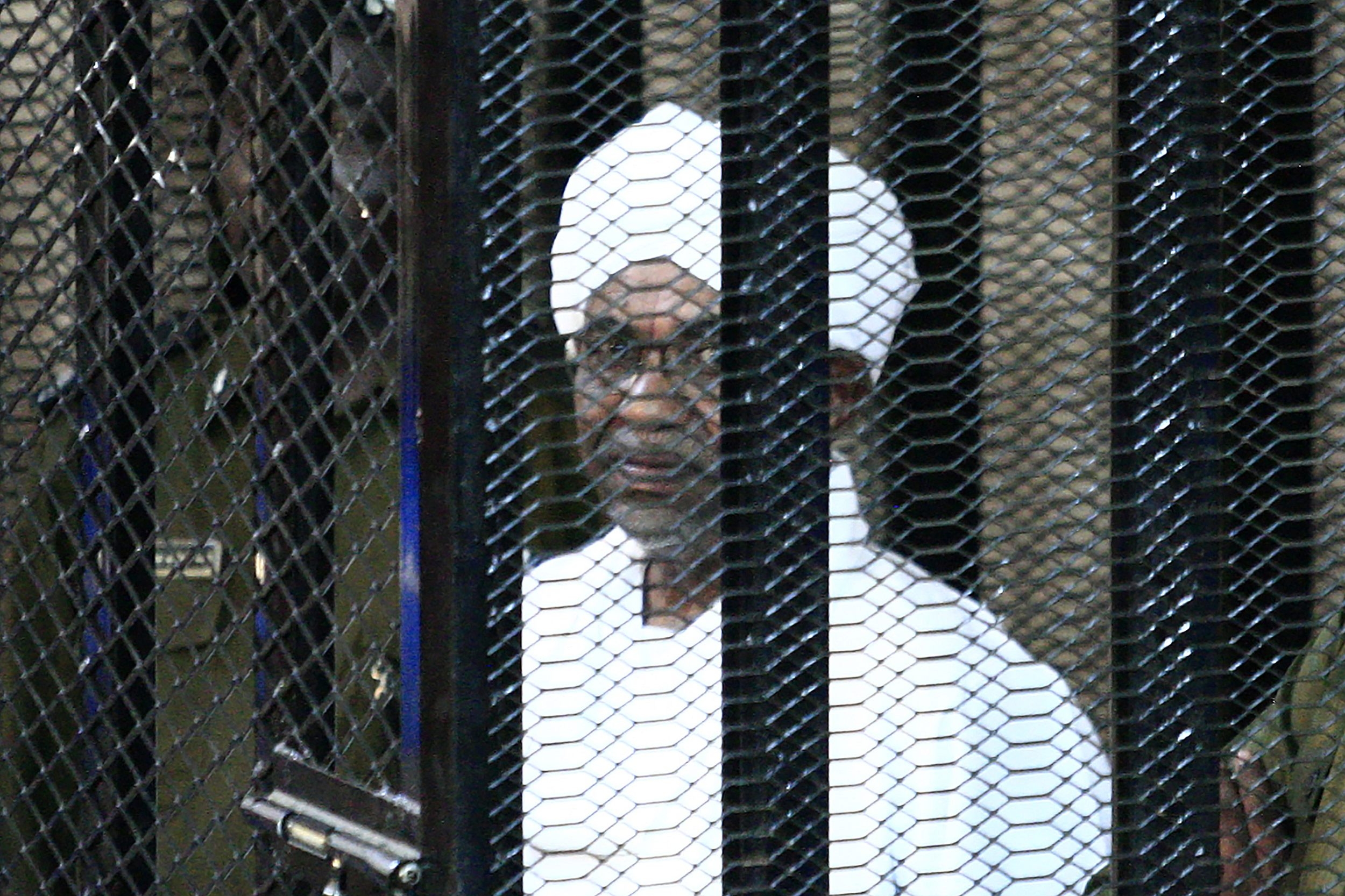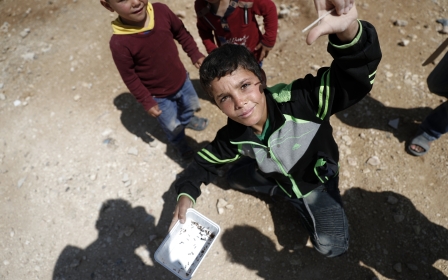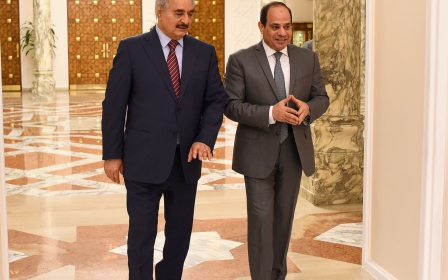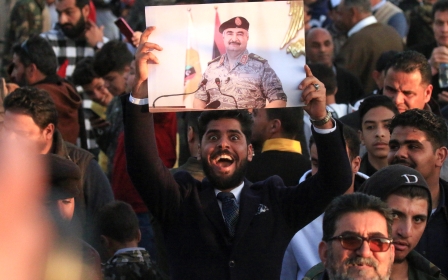Arabic press review: Sudan investigates Bashir's secret multi-million deposit

Sudan investigates Bashir's secret multi-million deposit
Former Sudanese president Omar al-Bashir refused to answer questions about a secret account which was receiving a deposit of $20m in “petty cash” every month during his reign, after Sudanese authorities launched an investigation looking into the matter, Al Taghyeer newspaper reported.
“Bashir is being investigated about a secret account of the presidency in which he deposited $20m to be spent as petty cash for the president of the country,” Al Taghyeer reported on Sunday, adding that Bashir was transferred from his prison to a special committee session in the capital centre amid tight security.
Bashir, who swept to power in a coup in 1989 and was deposed in April 2019, is being held in Khartoum’s Kober prison after being convicted of money laundering and corruption in December.
“This account has been recently disclosed by the Sudanese Anti-Corruption Commission, which is a committee specialised in restoring money from the previous regime symbols, and has a special prosecution,” the paper said.
New MEE newsletter: Jerusalem Dispatch
Sign up to get the latest insights and analysis on Israel-Palestine, alongside Turkey Unpacked and other MEE newsletters
A legal source told the Sudanese newspaper that Bashir “refused to answer the accusations he faced regarding the secret account that contained $20m and that was owned by the presidency of the republic”.
“It seems that the deposed president is pursuing his own way in dealing with the investigation committees by providing no information, following his lawyers' advice,” the source added.
Last August, at the beginning of Bashir’s corruption trial, the former autocrat admitted taking $90m in cash from Saudi Arabia's rulers, including Crown Prince Mohammed bin Salman. He also admitted that he had earlier received two payments from Saudi’s King Abdullah for $35m and $30m, which he had spent, according to the investigations.
In December, Bashir was found guilty of corruption and illegal possession of foreign funds and was sentenced to two years in a community reform centre on account of his old age.
Bashir, who is wanted by the International Criminal Court (ICC), will be handed over to the Hague where he is wanted on charges of genocide and war crimes, a member of Sudan's ruling Sovereign Council said in February.
The former leader is primarily wanted over actions taken during the conflict in Darfur. The UN has said the conflict left at least 300,000 people dead and displaced 2.5 million others.
Morocco's Othmani accuses UAE of meddling
Moroccan Prime Minister Saad Eddine el-Othmani has accused the United Arab Emirates (UAE) of trying to meddle in Morocco’s domestic affairs, the London-based Al-Quds Al-Arabi newspaper reported.
“There are unjust campaigns financed from abroad that tried to distort Morocco," Othmani, speaking to a youth forum organised by his party on Saturday, stated without naming the UAE directly.
Othmani’s comment comes weeks after an online confrontation between Morocco and the UAE, in which Rabat accused Abu Dhabi of sponsoring “electronic flies” that planted troll-like social media accounts that pumped out propaganda messages critical of the prime minister and his government, from the handling of the coronavirus pandemic to rumours of Morocco heading into a famine.
In response, Moroccan media launched the hashtag “Thank you Othmani”, which went viral.
The prime minister said there were countries "envious of Morocco for its successes” that tried to interfere in its affairs and attack its leaders, adding that the Moroccan people were “united to face these attempts”, according to Al-Quds Al-Arabi.
The paper said the UAE has been applying pressure on Morocco since the 2011 parliamentary elections saw an Islamist party, the Justice and Development Party, win the largest bloc. It also said that Abu Dhabi has not been “satisfied” with Morocco's neutral stance toward the Saudi-UAE blockade of Qatar in 2017.
In March, local newspaper Assabah reported that Morocco had withdrawn its ambassador from the UAE in what it called an “unprecedented crisis” between the two countries, which has been deepened by the more than year-long absence of the UAE ambassador in Rabat.
Morocco has not officially announced the withdrawal of its ambassador from Abu Dhabi, nor has the UAE officially recognised the tension between the two countries.
Jordan faces public anger over virus-hit economy
The Jordanian government is facing mounting criticism over its failure to deal with the economic fallout due to the coronavirus pandemic and protect the livelihood of its citizens, according to a report published in the London-based newspaper Al-Arabi Al-Jadeed.
Public anger grew after reports emerged that a number of government employees were paid “enormous salaries”, despite official decisions taken at the beginning of the pandemic that stipulated a freeze on salary increases for employees and military personnel, as well as the suspension of all post nominations until the end of the current year.
The already difficult economic situation in Jordan has been exacerbated by the pandemic, Jordanian MP Musa Hantash said, adding that the economic growth rate is expected to fall by more than five percent this year, according to Al-Arabi Al-Jadeed.
Hantash accused the government of making decisions that “do not serve the economic situation” and instead generate anger in the street, referring to the recent payment of “enormous salaries that are beyond the qualifications and abilities of the appointees”.
Jordan’s economy took a hit under tough measures imposed to curb the spread of Covid-19, before policies eased in early June.
The kingdom has so far registered 1,147 coronavirus infections, with only 10 deaths.
Still, health authorities have been reporting new cases recently among Jordanians and foreigners entering the country. They have also maintained measures including social distancing and the compulsory use of face masks in most public places, with those breaking the rules fined.
Kuwait to release more prisoners to combat Covid-19
Kuwait will release 1,200 prisoners in a bid to curb the spread of coronavirus among inmates, according to Al Khalij Al Jadid website.
The amnesty announcement was made on Sunday by Adel al-Dukhi, head of the Human Rights Committee of the National Assembly of Kuwait. He said the number of prisoners had already been reduced to just over 5,000, with 2,000 prisoners released in February and another group to be released soon.
This decision was part of the measures taken by the Kuwaiti government to reduce overcrowding in prisons amid the pandemic.
Arabic press review is a digest of reports that are not independently verified as accurate by Middle East Eye.
Middle East Eye delivers independent and unrivalled coverage and analysis of the Middle East, North Africa and beyond. To learn more about republishing this content and the associated fees, please fill out this form. More about MEE can be found here.




